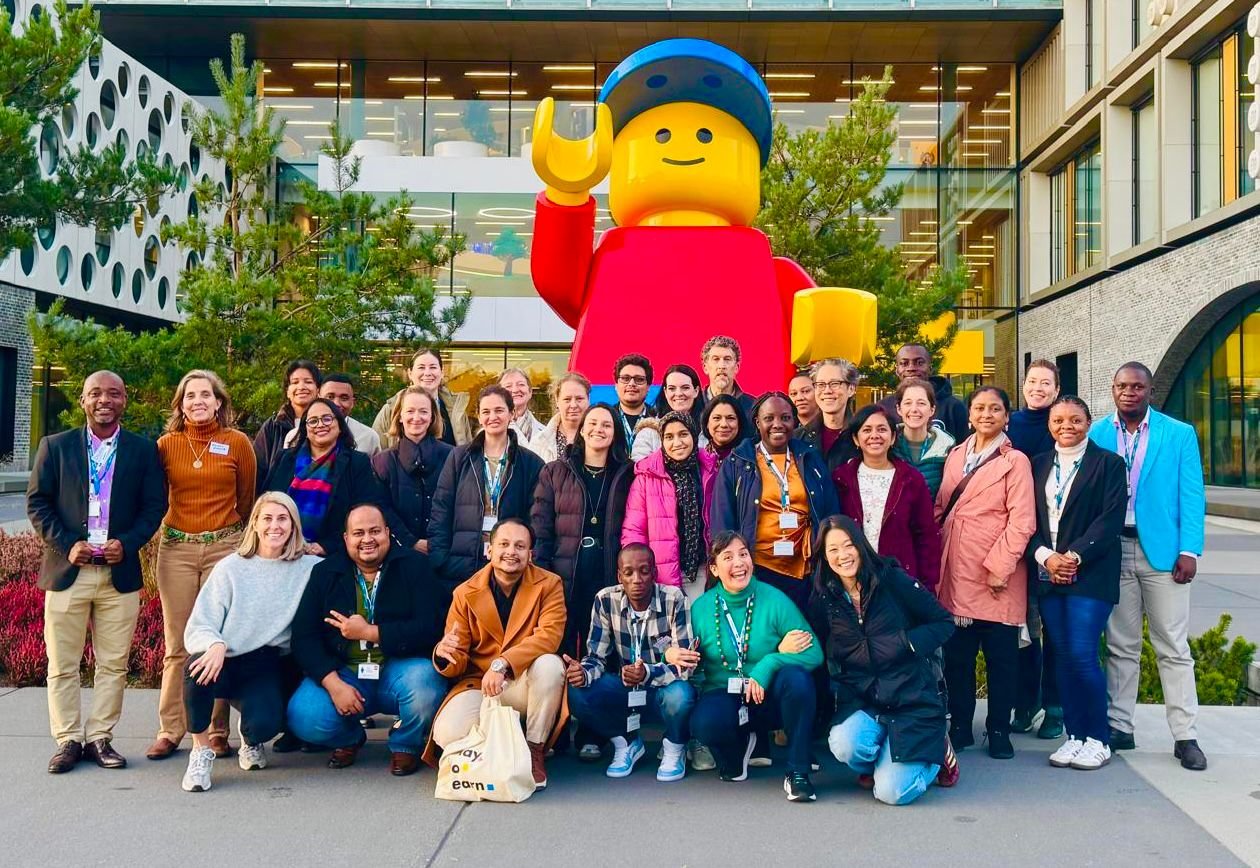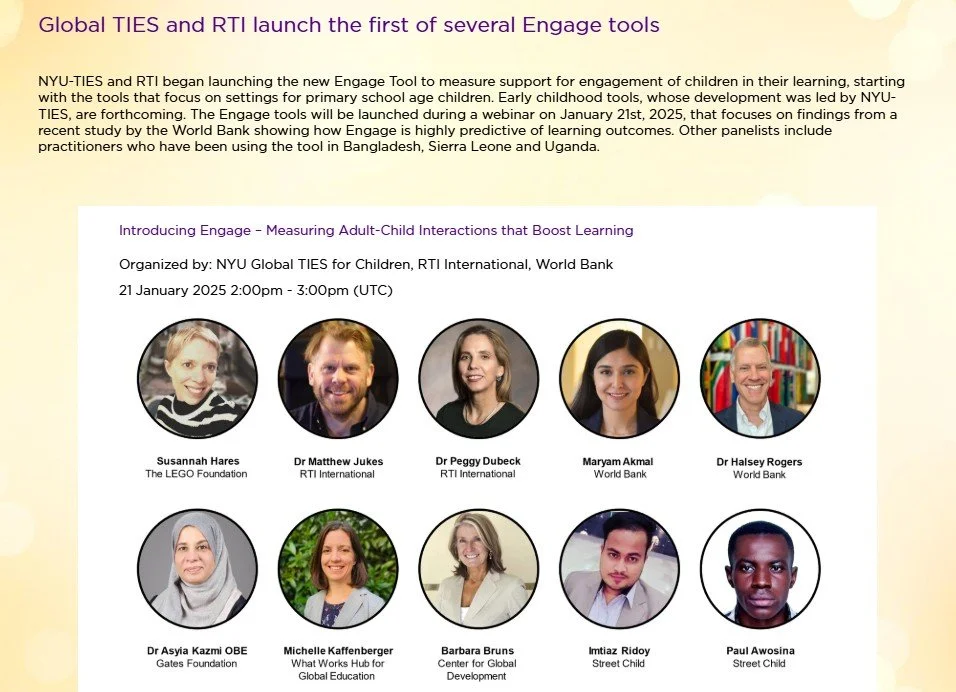Resources
Engage team members participate in the project’s final Comunity of Practice convening
From November 3-6, 2025, Hirokazu Yoshikawa and Sharon Kim represented Global TIES for Children at the final Engage Community of Practice convening, organized by EDC and hosted at the LEGO Foundation headquarters in Billund, Denmark.
Over three days, partners from across the Engage portfolio shared evidence and lessons on strengthening student engagement in early childhood and primary education across diverse contexts.
The sessions focused on:
Insights from implementing and adapting the Engage tools
Trends emerging across countries and developmental levels
How data can drive program improvement and system-level change
This convening wasn’t a “show-and-tell.” It was hands-on, reflective, and honest about what it takes to embed child-centered, playful learning approaches into teaching and learning systems—and sustain them.
Early Childhood Parenting Support – Call Quality Instrument (ECPS-CQI)
The ECPS-CQI instrument was developed in English by Anaga Ramachandranm, Dalia Al Ogaily, Kate Schwartz, Joyce Rafla and Hirokazu Yoshikawa and used to measure the quality of interactions during a phone call with a parent or caregiver. The instrument assesses the domains of relationship with family, responsiveness to family strength, needs, and culture, facilitation of caregiver-child interaction, and active listening. The ECPS-CQI tool has shown promising evidence for reliability and validity, and with caution, it can be used for intended purposes with similar samples/contexts.
Global TIES and RTI launch the first of several Engage tools
NYU-TIES and RTI began launching the new Engage Tool to measure support for engagement of children in their learning, starting with the tools that focus on settings for primary school age children. Early childhood tools, whose development was led by NYU-TIES, are forthcoming. The Engage tools will be launched during a webinar on January 21st, 2025, that focuses on findings from a recent study by the World Bank showing how Engage is highly predictive of learning outcomes. Other panelists include practitioners who have been using the tool in Bangladesh, Sierra Leone and Uganda.
HOLAS Assessment Bank
The Holistic Learning Assessment System (HOLAS) Bank is a curated inventory of educational tools/assessments and relevant monitoring and evaluation (M&E) resources designed for use and/or implemented in Colombia and Peru.
EdTech in Low-Resource Settings: Challenges, opportunities, and conditions for success
This report summarizes the results of a survey the Gobee team launched to better understand the experience of stakeholders in the Education in Emergencies (EiE) sector when it comes to EdTech in low-resource settings, with a special focus on digital assessments and what it takes to develop and maintain open-source models (OSS) and data protection regulations.
Meet the HEA Phase II Grantee: Madrasati
We hear from HEA Phase II Grantees, Madrasati, as they share about their innovation, journey to scale and experience within the HEA programme. With thanks to HEA mentors NYU-TIES for their work on this video.
Meet the HEA Phase II Grantees - iACT
We hear from HEA Phase II Grantees, iACT about their innovation, scaling journey to date and their experience during their time with the HEA programme.
Introducing the PLAY toolkit [teaser]
The toolkit measures how caregivers and teachers support children’s engagement in their learning. The toolkit consists of observation and survey tools for children from birth to 12-years-old and can be applied across diverse learning settings and contexts
Meet the HEA Phase II Grantees - Cohere
We hear from HEA Phase II Grantees, Cohere about their innovation, scaling journey and time with the HEA programme.
Humanitarian Education Accelerator Learning Synthesis
Over the past 7 years, the Humanitarian Education Accelerator (HEA) has supported 21 innovative and impactful education in emergency and protracted crises (EiEPC) solutions to transition to scale. Support has included financing and capacity building, and has focused on producing actionable evidence.
Many lessons have been learnt throughout the 7 years and 3 cohorts, including lessons for innovators, EiEPC practitioners, donors, and accelerators. We have compiled these lessons into a Learning Synthesis so that global audiences can share in the lessons learnt.
Piloting Gobee — what we learned from the first pilot of the gamified learning measurement tool
Since the beginning of the COVID pandemic we have seen a significant increase in the number of online tools and digital learning programmes being rolled out globally. With this increase comes a growing need to find adaptive ways of measuring the effectiveness of these interventions for children’s learning.
Where to Find Measures
This video is a guide for those interested in assessing holistic child development outcomes through navigating the different resources we have available to find high-quality measurement tools that can provide us with meaningful data. A lot of the resources the video covers are what we, as researchers, look towards as we navigate the largely unknown waters of measure development for children in low-and-middle-income contexts (LMICs).
Creating a Gamified Learning Measurement Tool — the why, the what & the how.
While many Governments have turned to connected education and tech-driven programmes to support continued learning during school closures, there is little available evidence on the impact of distance learning on learning outcomes, especially for children affected by crisis and conflict and regarding holistic learning outcomes. Understanding the impact of the growing number of digital interventions on learning outcomes for these children (both in and outside of the classroom) is crucial to ensuring that no child is left behind in the wake of COVID-19 disruptions. In order to be able to understand how to better support children’s learning, we first need to be able to understand what children know and are able to do. Armed with this information, teachers and educational programmes can then provide more tailored support. The assessment of learning outcomes is therefore key. In response to a clear gap in this area, a new partnership, brokered by Porticus, brought together War Child Holland, NYU Global TIES for Children, and the HEA to interrogate the need for an effective tool to assess learning outcomes across digital learning interventions.
Response to Stress Questionnaire (RSQ) - Niger
The original Response to Stress Questionnaire (RSQ: Connor-Smith et al., 2000) was designed to capture the ways that individuals react to and cope with specific sources of stress, including parental depression, family conflict, and academic stressors. In order to assess local and refugee children’s stress experiences and stress responses in Nigerien public school settings, researchers adapted the child self-report version of the RSQ-Academic Problems (RSQ-AP). It includes two subscales intended to assess: (a) academic problems stress and (b) involuntary engagement response to stress.
Self-Regulation Assessment-Assessor Report (SRA-AR) - Niger
The Self-Regulation Assessment-Assessor Report (SRA-AR) is a measurement tool used to capture assessors’ perceptions of of Nigerian refugee and Nigerien children’s skills at regulating their behavior during an assessment. The SRA-AR was developed based on the Preschool Self-Regulation Assessment-Assessor Report (PSRA-AR) (Smith-Donald et al., 2007). The developers tested this measurement tool in Niger.
Response to Stress Questionnaire (RSQ) - Lebanon
The original Response to Stress Questionnaire (RSQ: Connor-Smith et al., 2000) was designed to capture the ways that individuals react to and cope with specific sources of stress, including parental depression, family conflict, and academic stressors. In order to assess refugee children’s stress experiences and stress responses in Lebanese public school settings, researchers adapted the child self-report version of the RSQ-Academic Problems (RSQ-AP). It includes two subscales intended to assess: (a) academic problems stress and (b) involuntary engagement response to stress.
Self-Regulation Assessment-Assessor Report (SRA-AR) - Lebanon
The Self-Regulation Assessment-Assessor Report (SRA-AR) is a measurement tool used to capture assessors’ perceptions of children’s skills at regulating their behavior during an assessment. The SRA-AR was developed based on the Preschool Self-Regulation Assessment-Assessor Report (PSRA-AR) (Smith-Donald et al., 2007). The developers tested this measurement tool in Lebanon.
Child-Friendly School Questionnaire for Syrian Children in Lebanon (CFSQ-SL)
The Child-Friendly School Questionnaire for Syrian Children in Lebanon (CFSQ-SL) is a self-report survey that was used to capture primary-school aged Syrian refugee students’ perceptions of the climate of Lebanese public schools. CFSQ-SL was adapted and shortened from the original CFSQ developed by UNICEF.
SERAIS: Social Emotional Response and Information Scenarios Evidence on Construct Validity, Measurement Invariance, and Reliability in use with Syrian Refugee Children in Lebanon
Demonstrating that social-emotional learning (SEL) programs lead to improvements in children’s social-emotional skills requires the use of measures that provide accurate data capturing meaningful changes in children’s development over time. In contexts affected by crisis and conflict, few measures have the evidence required to support their use in program evaluations, limiting stakeholders’ ability to determine whether programs are working, how, and for whom. The Social Emotional Response and Information Scenarios (SERAIS) holds promise for addressing this gap. SERAIS (“I would” in French) employs a scenario-based format in which children are asked to report what they would do and feel in a variety of different social situations.









![Introducing the PLAY toolkit [teaser]](https://images.squarespace-cdn.com/content/v1/5fa0560c3a27c834f6a6b5ac/1680266280744-Q88JNJN0GAHBS4VCLC7Q/Screen%2BShot%2B2023-03-31%2Bat%2B08.37.29.jpg)











